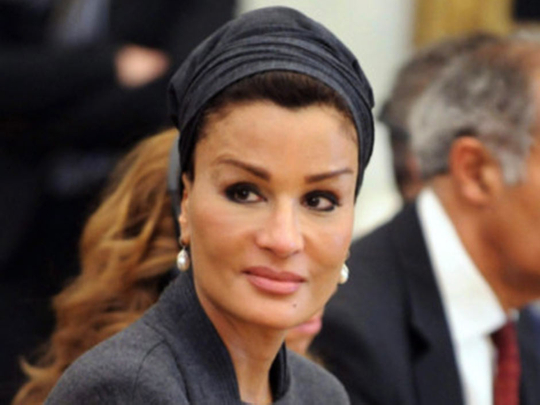
Dubai: Shaikha Mouza Bint Nasser, chairperson of the Qatar Foundation for Education, Science and Community Development (QF), has warned that the application of double standards and dodging collective responsibility are dehumanising Muslims.
“Why do Muslim lives matter less than the lives of others, if they matter at all?” Shaikha Mouza, the mother of Qatar’s emir, Shaikh Tamim Bin Hamad Al Thani, asked as she delivered a keynote speech at the opening of the Middle East Centre at St Antony’s College Oxford, touching on the current relationship between the Middle East and Europe.
She added that “Muslim-phobia” had devalued the lives of Muslims in Europe and America and highlighted a double standard in applying principles of free of speech, human rights and dignity.
She also referred to the growing “fear of real, living Muslims” in Europe and contrasted it with Europe’s curiosity and “respect for the vast and rich architectural, philosophical and historical traditions” of Islam, the Qatar News Agency (QNA) reported.
“A Muslim is first and foremost identified as a Muslim, rather than simply a human being. Whether they are Pakistani, Malaysian, Senegalese, or even British-born, their multiple identities are levelled under a constructed monolith of Islam,” she said.
“Let me remind you, however, that Islam has never been monolithical, but has from the start been a vast container for diverse cultures and ethnicities. The homogenisation of Muslims into a fearful and unknowable ‘other’, separate from the beauty and nobility of Islam and its civilisation, is at the root of Muslim-phobia.”
Referring to the use of language in analysing the rise of militancy, Shaikha Mouza highlighted a blatant discrepancy.
‘Medieval’
“The word ‘medieval’ is appearing more and more to describe the actions of radicals. But why do we insinuate that somehow those who are perpetuating certain acts of violence do not belong to our age? That somehow they are not ‘modern’? It is a naive refusal to accept our collective responsibility. Daesh is as modern as Guantanamo and Abu Ghraib. They are all products of our age,” she said.
One of the most influential and high-profile women in the Arab world, Shaikha Mouza gave fresh examples of the double standards contributing to the dehumanisation of Muslims.
“Why is it that world leaders gathered to march in defence of Charlie Hebdo, while the Chapel Hill murders were shrugged off as a parking dispute?” she asked, referring to the fatal shooting of three Muslim students, Deah Barakat, Yusr Mohammad Abu Salha, and her sister Razan Mohammad Abu Salhaby, by their neighbour in North Carolina in February.
“At the same time we are confronted with double standards. Why is it that apologies are offered when Europeans are mistakenly killed by drones, but only silence follows when innocent Yemeni and Pakistani children and civilians are killed by the same drones? Why do Muslim lives seem to matter less than the lives of others? If they matter at all. I believe this dehumanisation is cultivated through a process of Muslim-phobia.”
However, Shaikha Mouza’s diagnosis was not directed only toward the growth of Muslim-phobia in Europe but also toward Muslim countries that practice a type of “Islamophobia from within” by creating fear and suspicion of all things Islamic; in order “to solidify the existing grip on power.”
She connected this “Islamophobia from within” to the vestiges of colonisation and the suppression of the Arab spring.
“It is evident that colonisation leaves behind deep material, political, cultural and psychological scars, and gaping wounds. Debate is needed. Violent repression is not. Could this be a reason why we, as Muslims, have lost confidence in our ability to apply the universal and eternal Islamic values to our living traditions,” she asked.
Shaikha Mouza challenged academics to reach out beyond academia and communicate their research more widely in order to counteract the sensationalist narratives of mainstream media.
Arguing that “academia should serve society, not only observe it and comment upon it,” she said that Muslims have a responsibility to demonstrate that “Islam is a rich, living moral tradition that can offer solutions to universal challenges.”
She cited the example of the work being conducted at the Qatar Faculty of Islamic Studies in the application of Islamic values and ethics to global problems and advised young Muslims that “we should not only look back to history for the glory that was Islam but to the future and to the glory that is Islam.”
“We should be inspired not only by historical values, but by eternal ones,” she told the audience.
She warned that the lack of courage when it mattered meant paying a high price.
“Every act has a consequence, but so does every inaction.”
The Qatar Foundation, via the Qatar Faculty of Islamic Studies at Education City in Doha, and Oxford University, has a long history of collaboration and partnership that stretches back almost a decade.
Under the collaboration, annual exchanges of professors and joint research and workshops have taken place.
The collaboration also allows Qataris studying for their Masters in Middle Eastern Studies to spend up to a term at Oxford University.











